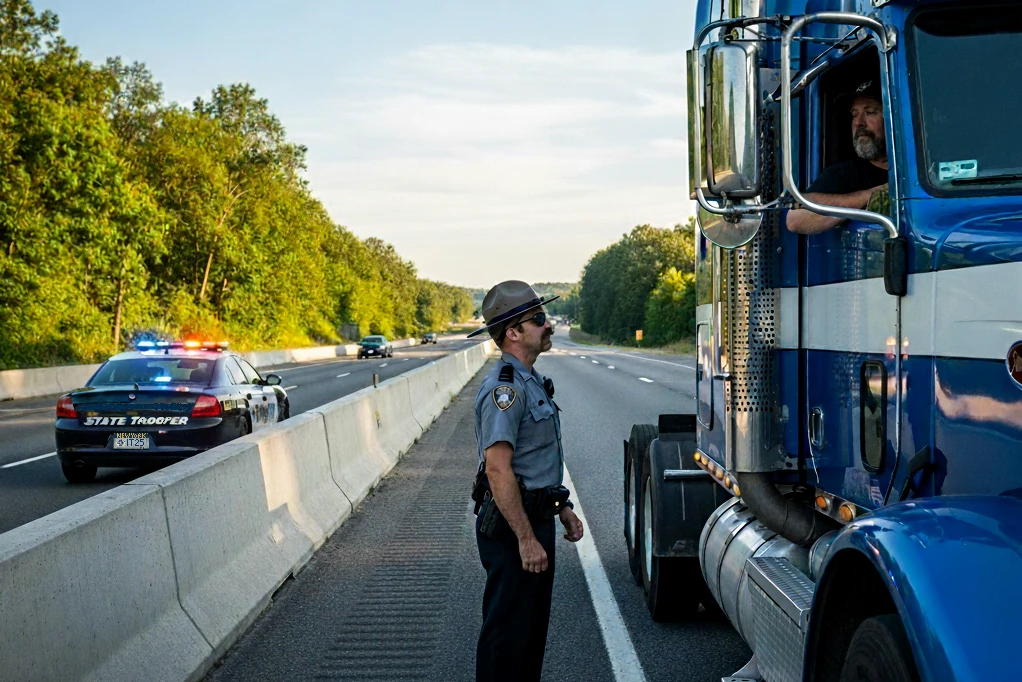
Commercial Motor Vehicles – Driving While Ability Impaired (VTL 1192(5)) – NY DWI & Traffic Ticket Lawyer
The Benjamin Goldman Law Office provides legal representation for motorists charged under VTL 1192(5), which specifically applies to commercial motor vehicle drivers. This statute establishes stricter standards for impairment because of the heightened responsibility placed on commercial drivers. Unlike regular motorists, a commercial driver can be found in violation with a lower blood alcohol concentration (BAC) threshold. A conviction under this law is taken seriously and can have devastating professional and legal consequences. Our law firm focuses on traffic and vehicle-related violations across the state, including DWAI charges under VTL 1192(5).
The Benjamin Goldman Law Office is available to assist drivers facing DWAI charges anywhere in New York State. No matter where your case is located, our firm can review the charges and explain your legal options. For example, we regularly represent motorists in Schenectady, Troy, Saratoga Springs, and Clifton Park. We also handle cases in surrounding counties such as Rensselaer, Schenectady, and Saratoga. Wherever you are in New York, consultations are always free.
VTL § 1192(5) – Commercial Motor Vehicles Driving While Ability Impaired
If you are charged under VTL 1192(5), prosecutors will allege that you operated a commercial motor vehicle while your ability was impaired by alcohol. This law applies when a commercial driver has a BAC of .04% or higher but less than .06%. Even though this BAC is below the legal limit for non-commercial drivers, it is enough to trigger charges for CDL holders. A violation of this statute is considered a serious traffic offense and can result in significant penalties, including fines, suspension or revocation of a commercial license, and possible jail time.
- Fine: $300 to $500 (first offense)
- Surcharge: $260 or $400, depending on the court
- License: Suspended or revoked, including CDL disqualification (first offense)
- Possible Jail: Up to 15 days
Although this may appear to be a minor violation compared to a standard DWI, because it is not a misdemeanor, a charge under New York Vehicle & Traffic Law § 1192(5) is still a serious matter. For commercial drivers, the consequences can be career-ending, as losing CDL privileges often means losing employment. A conviction also results in a permanent record that can affect future opportunities. It is highly advisable to speak with an experienced attorney before making any decisions about your case.
Statute
The exact wording of the relevant sub-statute is:
§ 1192. Operating a motor vehicle while under the influence of alcohol or drugs.
5. Commercial motor vehicles: driving while ability impaired. No person shall operate a commercial motor vehicle while such person’s ability to operate such a vehicle is impaired by the consumption of alcohol, with a blood alcohol concentration of .04 of one per centum or more but less than .06 of one per centum by weight of alcohol in the person’s blood.
Understanding VTL § 1192(5)
VTL § 1192(5) reflects New York’s strict stance on alcohol consumption by commercial drivers. The law recognizes that even a small amount of alcohol can pose risks when operating large or passenger-carrying vehicles. For this reason, CDL holders face stricter thresholds and harsher consequences than regular drivers. A violation may also overlap with federal Department of Transportation (DOT) regulations, further jeopardizing a driver’s professional standing.
Many commercial drivers may not realize that this law applies even at a BAC that would be legal for non-commercial motorists. This means that a BAC as low as .04% can result in charges.. Even first-time offenders are treated seriously under this law, and CDL disqualification can occur immediately.
How to Fight a Commercial DWAI in NY (VTL § 1192(5))
Being charged under New York’s commercial DWAI statute is a serious matter, but commercial drivers should remember they have the right to contest the charge. Entering a Not Guilty plea is not a statement of innocence or an admission of guilt; it is the legal mechanism that compels the prosecution to prove its case beyond a reasonable doubt. By exercising this right, the evidence, testing procedures, and circumstances of the arrest can be carefully reviewed in court.
Because this offense directly affects your career and livelihood, prosecutors and judges will treat the case with seriousness. However, the legal process often leaves room for negotiation, and the outcome may depend heavily on the details of the arrest. Factors such as the accuracy of chemical testing devices, the legality of the traffic stop, and adherence to police procedures can all influence whether charges are reduced, challenged, or dismissed.
An experienced DWAI attorney can provide essential guidance when facing charges under VTL § 1192(5). Legal counsel can review the details of your arrest, challenge the validity of the BAC results or officer’s observations, and identify possible defenses. An attorney can also negotiate with prosecutors to seek a reduction in charges or protect your CDL from permanent disqualification on your behalf.
CALL NOWOther Traffic Violations We Handle
If you were injured in an accident involving a DWI, you can contact the Sternberg Injury Law Firm and they can advise you of your options
Disclaimer: All the content of this website has been prepared by Benjamin Goldman Law Office PC for informational purposes only and does not constitute legal advice. The information on this website shall not be construed as an offer to represent you, nor is it intended to create, nor shall the receipt of such information constitute, an attorney-client relationship. Our hope is that you will find the information useful and informative, and we would be happy to communicate with you and answer any questions you may have about our legal services. Readers should not act upon the information on this website, or decide not to act based upon the information on this website, without first seeking appropriate professional counsel from an attorney licensed in the home state of the drivers license of the person who received the relevant traffic citation.